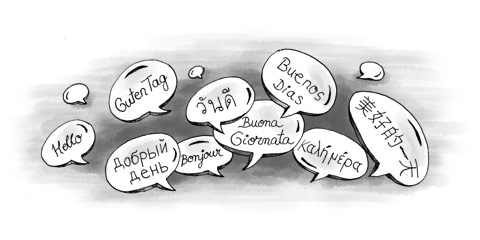English ranks only fifth in terms of the number of people who speak it as a first language, but it’s the usual language of administration, commerce, the media and politics and is widely spoken in all of South Africa’s cities and most towns. The most commonly spoken language is Zulu, followed by Xhosa, Afrikaans, Pedi, English, Tswana, Sotho, Tsonga, Swati, Venda and Ndebele.
It’s usual for the black inhabitants of South Africa’s cities to speak as many as six languages, while white inhabitants often speak two: English and Afrikaans. Most documentation in South Africa is printed in both these languages, although the vast majority of Afrikaans-speakers also speak good English.
Around 40 per cent of white South Africans are mother-tongue English speakers, but, as is the case with the various ‘styles’ of English spoken throughout the world, South African English has developed its own accent and characteristics, some due to the influence of Afrikaans. Grammar, spelling and vocabulary usually follow British rather than North American English, as does usage. For example, South Africans invariably refer to a ‘lift’ rather than an ‘elevator’, and when refilling the car, ask for ‘petrol’ not ‘gas’. Repetition is sometimes used to emphasise a point. For example, a crowded bar or restaurant is referred to as ‘full, full’, and a freezing winter day might be ‘cold, cold’. South African English also borrows words from Afrikaans and native African tongues, making for an interesting and varied vocabulary. Those wanting to know more are recommended to consult the Oxford Dictionary of South African English or visit the Afrikaans Language Museum (Tel. 021-872 3441) in Paarl (a town in the Cape Wine Region).
It’s still widely believed that Afrikaans is spoken exclusively by descendants of the Dutch settlers in South Africa (members of the Afrikaner tribe), but in fact it’s spoken by as many non-white as white South Africans – roughly 3 million of each. Afrikaans developed out of Dutch from the 17th century, when the first settlers arrived, gradually dispensing with the Dutch language’s complex grammar and acquiring words from English, French, indigenous African languages and even the languages spoken by East Asian slaves. It was recognised as a descrete language in 1925, having previously been regarded as a dialect of Dutch. Afrikaans is the dominant language in the Western and Northern Cape, while in the Free State it’s the language of the media.
With a little ‘acclimatisation’, Dutch-speakers should be able to understand and communicate with Afrikaans-speakers. For those who wish to learn it, Afrikaans is a phonetic language, words usually being pronounced the way they’re spelled (unlike English), and it uses the guttural consonantal sounds of Germanic tongues. The letter ‘g’ is pronounced ‘kh’, ‘oe’ is pronounced ‘oo’ and ‘v’ is pronounced ‘f’.

